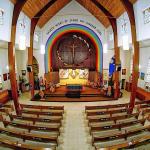
Both youth and recent converts to a new faith often show a lot of zeal for what they believe. While Christians should recognize the value of such zeal, they should also understand its dangers. Those who are zealous in their youth, or in their inexperience, do not have the wisdom and knowledge to back them up, and so they seek to do what they believe God wants them to do, but they do so without prudence. Worse yet, they end up thinking that they have already learned everything they need to know, and so, instead of growing by listening to others, they expect others to listen to them, to follow them and be just like them with their limited understanding. In regards the Christian faith, this means they end up promoting a counter-faith, a partial representation of the faith, which easily is turned into legalism or heresy, as they end up rejecting that which they don’t already understand. And, as they expect others to share their interests and concerns, they often have no room for charity or prudence for the experiences and concerns of others, which is why this kind of legalism, as Paul said, is a dead end. Without wisdom, wisdom which comes from experience, without humility, and indeed, without charity, such zeal will make for a great fall. Often, those with such zeal rely upon themselves, and what they think they know, above all other things; the zeal seems to do them good, as it seems to lift them up to great heights, but as the zeal cools down, as life goes on, they will find themselves faltering, and then the danger will prove itself real as they will then find themselves falling from those heights, falling because they have not properly set themselves up upon a stable base. After all, “whoever exalts himself will be humbled, and whoever humbles himself will be exalted” (Matt. 22:12 RSV).
Obviously, zeal can be a good thing, but it needs to be mixed with prudence. The zeal that new converts experience for the faith, just like the zeal of youth, is not sustainable all by itself. It needs wisdom. It needs guidance. When the young grow old, or when those who are new to the faith find the faith loses its novelty, the zeal itself is likely to vanish. If there is no foundation set up to encourage further growth, then the person can find their faith itself wanes. Zeal can be used to help direct the zealous to seek for something better, something long-lasting, but that means, the zealous will have to be willing to be directed by others instead of put into positions of leadership or authority. They should be trained instead of treated as experts. This is why it was understood in ancient monastic communities that new monks, just like new converts, needed to be told to be patient with themselves, and not let their zeal make them do things they are not ready to do because they have neither the knowledge (from experience or study) nor the discipline (which helps counter rash actions) to know what it is they should be doing. When a new monk was seen trying to push to do too much, thanks to their zeal, it was understood that someone should have to come to help them bring them back to a solid foundation:
The elders said, “If you see a youngster rising up to heaven of his own volition, seize his foot and pull him back from there, for it is not good for him.”[1]
It is important, of course, for those with zeal to be encouraged to keep to their zeal, but to make sure it is properly directed. What is true for new monks, is also true for new converts to the Christian faith, even as it is for those who were raised in their faith but found a new appreciation and love for it later in life. The zeal is good, but it can easily be misdirected. Those who have long been in the faith, who have had it tried, and made true through such trial, will recognize the good in such zeal, but they will recognize how imperfect it is as well. Those new converts will believe they know everything based upon the limited study and experience they have, but the reality is, they have only encountered a portion of the faith, and so they should be encouraged to explore the greater, wider depth of the faith and all that is found in that greater depth, so as to find a way to properly anchor their zeal. That is what is often lacking with converts. They have yet to bring everything together, and so they try to anchor what they have learned to the thoughts and beliefs they had in their past, which of course, can and will cause problems in the future as they prove to continue to think in ways contrary to the faith itself.
It is important for new converts to take time for their conversion to take effect. They should listen to others, and learn from them instead of thinking they know everything themselves. Even if they have good a good theoretical knowledge of the faith, and have done a lot of book-learning, they still have yet to come to understand it all from the experience. The last thing they need to do is use their zeal as an excuse to take a position of leadership in the church. They need to learn to truly appreciate the fullness of the faith, not just the elements they have already learned, and how to properly live it out, and not with the strict, legalistic understanding many converts have when they first convert. Those who quickly become famous for their conversion without taking such time risk being stuck as they are, serving as an incomplete, imperfect example of the faith. Because of the fame they receive, many others will look up to them and follow after them and their example; thus, through their imprudence, they will not only hurt themselves, but many others as well. It is, indeed, important to realize that strict, legalistic rigor, though it might help some, will hurt many others, which is why monastic communities, over time, learned it was best to begin ascetic training through gentle, not harsh, means:
One of the fathers used to say, “Our fathers entered into life by harshness, but let us enter by gentleness if we can.” [2]
This is something those who have gained wisdom from experience understand, while many new converts, filled with zeal, often do not. Zeal often burns out. What is left once it is gone depends upon what one did with it. For many, the faith itself can vanish once the zeal is lost, because they did not find a firm foundation for their faith. To make sure this does not happen, we should always encourage prudence and charity, making sure that whatever zeal people have is used to encourage them to learn more, to listen, and to be patient so as to make sure their faith takes hold. But, of course, this is not only true with recent converts, in a way it should be true for all of us, as we should be in the process of constant conversion and reform ourselves. We should always work out our salvation with charity, embracing the greater wisdom and prudence of the community instead of focusing on ourselves all alone. That way, we will find ourselves growing in faith, instead of being stuck to the way we understood it in the past.
[1] John Wortley, trans., The Book of the Elders: Sayings of the Desert Fathers (Collegeville, MN: Cistercian Publications, 2012), 184 [N244].
[2] John Wortley, trans., The Book of the Elders: Sayings of the Desert Fathers, 186 [N665].
Stay in touch! Like A Little Bit of Nothing on Facebook.
If you liked what you read, please consider sharing it with your friends and family!












